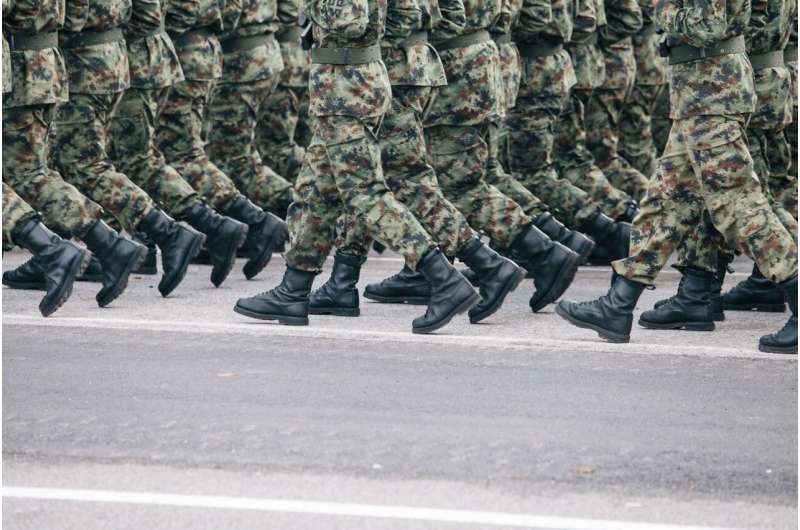This article has been reviewed according to Science X's editorial process and policies. Editors have highlighted the following attributes while ensuring the content's credibility:
fact-checked
trusted source
proofread
New report reveals servicewomen in British military being badly let down when reporting sexual violence

Servicewomen in the British military are being badly let down when reporting sexual violence, with some victims even punished for breaches of military rules when making a report, new research reveals.
Researchers say there is an urgent need to overhaul the "military's misogynistic gender culture", as well as end the misuse of disciplinary procedures against victims who breach codes of conduct when they report sexual violence.
The research, led by the University of York and published in the The RUSI Journal, found that women who experienced sexual violence often feel betrayed by responses to their reports, both by the chain of command and by their peers.
They often felt isolated and bullied, and, in some cases, punished by their commanders because, at the time of the assault, they had been drinking or fraternizing with subordinates.
The authors of the report say the findings are particularly compelling coming in the immediate aftermath of the Service Inquiry report into the death of Royal Artillery Gunner Jaysley-Louise Beck, who was found dead at Larkhill Camp in Wiltshire in December 2021 after experiencing "an intense period of unwelcome behavior."
One participant who took part in the University of York study described how the camp they were based at turned into a "hostile environment" after she reported her assault. Colleagues stated that they did not believe her and refused to work with her.
She was told by her commander that she was becoming an "inconvenience" because of the bad atmosphere it was creating. Some of her fellow servicewomen, she told the interviewer, "would come to me and be like 'it happened to me, I believe you,' it was kind of like a small MeToo movement… [but] if you spoke out, you [were] ostracized."
Reputation
Several participants believed that there was an overriding concern with keeping negative stories out of the media to protect the military's reputation.
One participant told the authors of the report that, following her report of rape, her superiors ordered that potential evidence be deleted from mobile phones, because of a concern that photos or videos would end up on social media: "Basically they couldn't have anything that would expose them to anything. Basically covering up," she said.
Others suggested that the concern over keeping stories of sexual violence out of the media was particularly powerful when there were senior officers involved: "anything that they can keep out of the media they will… especially if there's rank involved, you know, if there is a high-ranking officer, abuse of power, they absolutely don't want that making the media."
Understudied
While sexual violence in the British military remains understudied by academics, the 2021 Armed Forces Continuous Attitudes Survey reported that 11% of female personnel (and less than 1% of male personnel) had experienced sexual harassment in the Service environment in the previous 12 months.
Respondents to the Army's 2021 Sexual Harassment Survey revealed that 19% had experienced unwanted attempts to establish a sexual relationship, 7% had been treated badly for refusing to have sex with someone, 4% had been subjected to a sexual activity to which they were unable to consent, 2.6% had been seriously sexually assaulted, and 1.8% had been raped.
Further harm
Lead author, Dr. Harriet Gray from the Department of Politics and International Relations at the University of York, said, "Sexual violence and harassment within the British military is a serious and widespread problem.
"We find that responses to reporting sexual violence in the British military can cause further harm to victim-survivors above and beyond that engendered by the violence itself.
"Some of these harms are caused by a gendered military culture that belittles the importance of and/or normalizes sexual violence. This leaves victim-survivors vulnerable to bullying and ostracization.
"Change will require real, serious, and widespread efforts to transform the military's misogynistic gender culture, even where this might impede the perceived benefits of maintaining a masculine culture."
Betrayed
Clinical advisor to the Center for Military Justice, Dr. Nicola Lester, said that the response of organizations to trauma can either be a source of comfort and support or serve to exacerbate the distress of victim survivors. "Unfortunately, our research has indicated that servicewomen are betrayed by the organization when they report the sexual violence that they have endured, leading to experiences of shame, blame and dehumanization," she said.
Emma Norton, founder and director of the Center for Military Justice, a charity that represents and supports women in the armed forces who have suffered sexual harassment and violence, added, "Sexual violence is an issue that affects the whole of society—but for women in the military, our research shows how they must navigate very particular additional challenges that can have career-ending, life-changing consequences.
"An organization that professes to have 'zero-tolerance' of these behaviors must ask itself what it needs to do to address these wider problematic attitudes towards women that speak out."
More information: Harriet Gray et al, Servicewomen's Experiences of the Aftermath of Sexual Assault in the British Military, The RUSI Journal (2023). DOI: 10.1080/03071847.2023.2276305
Provided by University of York




















